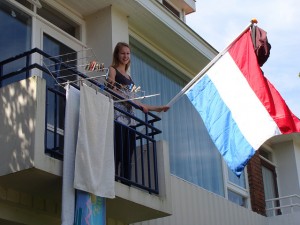to pass an exam, to succeed, to accomplish, to be successful [verb] [slaagde, geslaagd] [‘slaa-gun’]
 This time of the year in the Netherlands, you often see houses where the Dutch flag is raised with a schoolbag attached to it. This indicates that the owner of the bag has passed his or her high/secondary school final exams. Sometimes you see the bag only, if they don’t have a flag.(Photo: evanstra (flickr.com) – some rights reserved.)
This time of the year in the Netherlands, you often see houses where the Dutch flag is raised with a schoolbag attached to it. This indicates that the owner of the bag has passed his or her high/secondary school final exams. Sometimes you see the bag only, if they don’t have a flag.(Photo: evanstra (flickr.com) – some rights reserved.)
The Dutch word for passing an exam is “slagen”, it can be used with or without a reference to the exam. “Slagen” in general has the meaning of succeeding in something, see the ‘Examples’.
Examples:
– “Ik ben zo blij dat ik geslaagd ben, ongelofelijk gewoon!”
(“I’m so happy that I have passed my exams, just unbelievable!”)
– “Natalia is vanmiddag wezen winkelen, ik ben benieuwd of zij geslaagd is.”
(“Natalia went shopping this afternoon, I wonder if she found what she was looking for.”)
– “En, zijn jullie geslaagd??”
(“And, have you been successful?” Here it is implied that one went out to buy something, look for something etc. Of course it can also mean “And, have you passed your exams?”))
– “Het Nederlands voetbalelftal is er niet in geslaagd zich te kwalificeren voor het WK.”
(“The Dutch football/soccer team did not succeed in qualifiying for the World Championship.” This is of course purely hypothetical! When you hear somebody talk about the “WK”, it is always the World Championship football/soccer.)
– “<dokter:> Meneer, ik kan u gelukkig melden dat de operatie is geslaagd.”
(“<doctor:> Sir, fortunately I can tell you that the operation was successful.”)
– “Hé, was het gisteravond nog leuk?” – “Ja, het was een bijzonder geslaagde avond!”
(“What about last night, was it fun? – “Yes, it was a really nice night!”)
– “Het team-building uitje werd door velen als een geslaagd initiatief beoordeeld.”
(“The team-building outing was judged by many as a successful initiative.” Note that “uitje” is also the diminutive of “ui“, but here it is derived from “uit”.)
Related words:
– “Zakken”: to fail an exam.
– “Fiasco”: fiasco, disaster.
– “Falen”: to fail.




